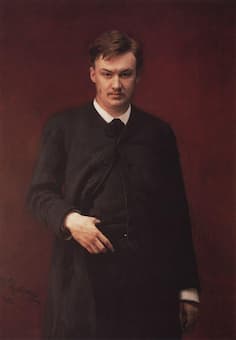
Alexander Glazunov
Alexander Glazunov, born on 10 August 1865 in St Petersburg, was a musical prodigy. His father Alexander was in the publishing business, and his mother Yelena, née Gromova, was a professional pianist. From his earliest years, Glazunov was blessed with an exceptional ear and astonishing musical memory. He began his study of piano at the age of nine with Elenkovsky, and two years later started to produce his first compositions. In 1879 he attracted the attention of Mily Balakirev, who encouraged the boy to broaden his general musical education while taking lessons from Rimsky-Korsakov.
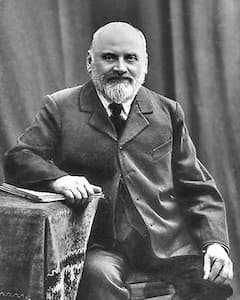
Mily Balakirev
Rimsky-Korsakov writes in his memoirs, “Casually Balakirev once brought me the composition of a fourteen-or fifteen-year-old high-school student, Sasha Glazunov. It was an orchestral score written in childish fashion. The boy’s talent was indubitably clear… He was a charming boy, with beautiful eyes, who played the piano very clumsily…Elementary theory and solfeggio proved unnecessary for him, as he had a superior ear. After a few lessons in harmony, I took him directly into counterpoint, to which he applied himself zealously.”
Alexander Glazunov: Suite on the Name “Sacha”, Op. 3 (Tatjana Franova, piano)
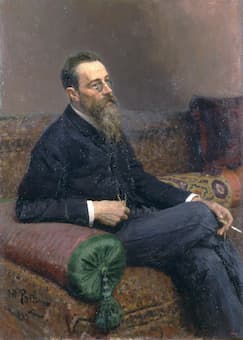
Nikolai Rimsky-Korsakov
Rimsky-Korsakov writes, “His musical development progressed not by the day, but literally by the hours. From the very beginning of our lessons, my relations with Sasha, from mere acquaintanceship and the attitude of teacher to pupil, began to gradually turn into friendship, despite the disparity in our age.” After a short period of study with Rimsky-Korsakov, Glazunov was told “that henceforth, he regarded it as unnecessary to instruct me systematically in return for payment, as I had already more or less become a mature musician.” In fact, Glazunov completed his First Symphony at the age of 16, which is dedicated to Rimsky-Korsakov. It was premiered under Balakirev’s leadership at the second concert of the Free Music School. Rimsky-Korsakov remembered, “That was truly a day of rejoicing for all of us…Youthful in inspiration, but mature in technique and form, the symphony reaped great success.” It was told that when Glazunov walked onto the stage to receive the cheers of the audience, the crowd was shocked to see a 17-year-old boy wearing a school uniform.
Alexander Glazunov: Symphony No. 1 in E-flat Major, Op. 5
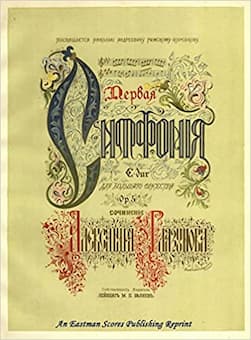
Glazunov’s First Symphony
Critics were skeptical that such a work could have sprung from the pen of a mere boy, and caricatures “appeared that presented Glazunov as a suckling baby.” Balakirev kept assuring the public that “the symphony had not been written by him at all, but had been ordered by his wealthy parents from everybody knows whom.” For Rimsky-Korsakov “this symphony was the first of a series of original compositions by the highly gifted artist and indefatigable worker, compositions which gradually spread also to Western Europe and came to be the finest adornments of contemporary musical literature.” Glazunov followed up the success of his First Symphony with his First String Quartet, which was first presented in November 1882. This particular work caught the attention of Tchaikovsky, who also heard the premiere of Glazunov’s First Symphony. After studying the score of the string quartet he excitedly wrote in a letter to Balakirev “that Glazunov’s talent is undeniable.” Even more importantly, it also attracted the attention of the wealthy arts patron Mitrofan Belyayev.
Alexander Glazunov: String Quartet No. 1, Op. 1 (Moscow Philharmonic Quartet)
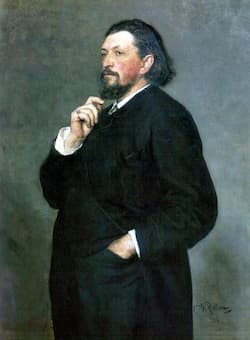
Mitrofan Belyayev
Belyayev was one of a growing number of Russian nouveau-riche industrialists who became patrons of the arts. He was an amateur viola player and chamber music enthusiast, and he hosted “quartet Fridays” at his home in St Petersburg. Rimsky-Korsakov writes, “The evenings usually opened with Haydn, then came Mozart, then Beethoven, and last some quartet of post-Beethoven music. Belyayev’s Fridays became rather well attended, and in addition to the usual quartet-players, they were attended by Glazunov, Borodin, Lyadov, Dütsch, and myself. Sasha Glazunov tried out his first string quartet at the Belyayev’s Fridays. Subsequently, all his quartets and quartet suites, even those not quite finished, were played at the house of Belyayev, who was thoroughly in love with the youthful composer’s talents.” It was Mitrofan Belyayev who proposed to publish Glazunov’s First Symphony in orchestral score, orchestral parts, and an arrangement for four hands in Leipzig. With this publication, entirely financed by Belyayev, the patron established his own publishing house focusing on works by Russian composers. Glazunov’s First Symphony was followed in print, in progressive order, by all of Glazunov’s newly appearing compositions.
For more of the best in classical music, sign up to our E-Newsletter
Alexander Glazunov: Suite caracteristique, Op. 9 (Russian State Symphony Orchestra; Valery Polyansky, cond.)
